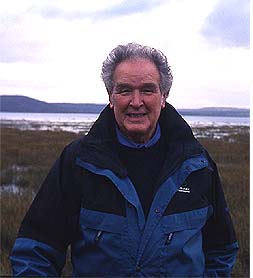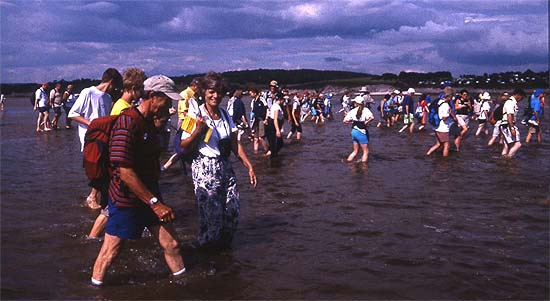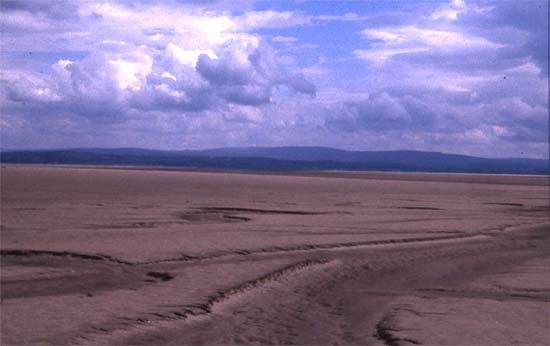The Sandwalker of Morecambe Bay
by Diane Parkin
 Morecambe Bay -- a large ingress at the edge of the Lake District -- is internationally famous for its walk. The bay is also renowned for its dangerous sea currents and notorious quicksand. If you want to walk across, you should enlist the services of a guide. For more than 40 years that guide has been Cedric Robinson, aged 72 in February. Morecambe Bay -- a large ingress at the edge of the Lake District -- is internationally famous for its walk. The bay is also renowned for its dangerous sea currents and notorious quicksand. If you want to walk across, you should enlist the services of a guide. For more than 40 years that guide has been Cedric Robinson, aged 72 in February.
Why cross such a treacherous expanse at all? According to Cedric, "Years ago, before the coming of the railway, it was a necessity. People in one village needed to get to another, so they'd take to the sands. Many lives were lost, so there was a petition put to the king. The first royal appointed guides were in the 1500s. Before then, it was the monks of Furness at Cartmell Priory."
It is the River Kent that causes all of the problems. As Cedric explains: "The river moves. Wherever the river is determines the route and what time you can start and finish a walk. It seems to have a pattern. For 35 years it was on one shore. Then 20 years ago it moved right across the bay. Overnight. This is the danger."
Many people make the walk across Morecambe Bay to raise funds for children's hospices all over the country. The walkers enjoy themselves and have the satisfaction of knowing they've helped a good cause.
Cedric remembered one particular group with respect: "It was out of season and I wouldn't have normally taken anybody out. It was teeming with rain and blowing a gale. But they were in charge of those Outward Bounds centres or from mountain rescue organisations. They were all fit and energetic. It was a grand event.
"While we were out there, a local resident called the coastguard. She told them there was a group of people out in Morecambe Bay with the tide all around them. The sand was wet, but we were four miles down and there was no tide. She wouldn't have known that, though."

Cedric's humorous tales, however, also point out the serious nature of the walk. "There was one chap who was determined to do the walk. Had we kept to the sand I think he would have made it. But the river moved and we had to make inland over Silverdale Marsh É and he had a wooden leg. Once we got going over the marsh his wooden leg kept sticking. He had somebody with him but he was holding up the group -- 150 of them. Because of the change of route it was taking us longer and you have to be at the river at pretty much the right time. I felt sorry for him, but we had to get transport for him. He was terribly disappointed.
"We've taken people across in wheelchairs too, and that can be funny. When the water's coming up they push down on the handles so their feet come upÉ but their bottoms go down and they're shrieking with laughter."
The distance across the bay is about four miles. You can't get from one side to the other without crossing the river, and that's the highlight of the walk. Some people turn up in wellies, which are no good as the water goes over the tops. Cedric's advice is to wear trainers as walkers start on a rocky shore for 45 minutes before going out into the bay.
He can read the sands like someone else would read a newspaper. Some areas could be a mile wide but others are only as big as the path he has marked. "I mark the route with laurel bushes beforehand. A branch is put well down in the sand. They stay on the high sand for about two weeks. In the lower areas the rising tide moves them. If everything was the same every day, you wouldn't need a guide and they could just put up a signpost.
"Heavy rainfall can make the crossing too hazardous. People could be washed off their feet. It doesn't often happen, but they get disappointed if they've organised a walk to raise money. I'll take them out the same distance so they can still raise their money. If it's a fine day and the sun is shining, they don't realise that the water is still coming down the river from the previous day and that it could be too deep."
Although most of the walkers are happy to comply with Cedric's advice, there are exceptions, such as a group of seasoned ramblers who had been before. "Once they turned from the river and could see where we were headed, they went off by themselves. I had to blow my whistle and remind them that I was responsible for everyone on the walk. We had to let the others catch up." Cedric chuckled. "They didn't like that."

Before becoming the Queen's Guide to the Sands, Cedric was a fisherman. "In Flookborough the tide goes out for many miles so they don't fish with boats, but with horse and cart. That's how I was brought up to fish. In the winter we went six or seven miles. You didn't just go out on fine days. You went whatever the weather -- rain, hail, snow or fog.
"When you do that for years it's a learning process. That's where my learning came from for this job -- by being a fisherman in the bay. It's never a good living but it's a way of life. I wouldn't have liked to do anything else. We struggled but we managed. I was appointed in 1963. We got the house," he indicated the cosy sitting room we were in, "but I don't get paid.
"I don't fish commercially now, but still set nets out there. I take children out on educational visits. Two years ago I had a group from Chernobyl and they couldn't speak English. It was exciting for them, so that's why I keep my nets on. When I get the chance I bring the fish home."
Celebrities escorted across the sands by Cedric include Melvyn Bragg, Judith Chalmers, Julie Hesmondhalgh (Hayley Cropper in Coronation Street), and the Duke of Edinburgh.
It isn't all fun and games in the bay. Many people have died, including some in recent times. A man died on one of Cedric's walks. "He had a heart complaint but most weekends he walked up the Lake District. We were about three parts of the way over when he died. I had a friend with me who was able to continue with the walk while I went for the police. The sad thing was his relatives were waiting on the other shore. They came to see us afterwards to let us know he'd died doing something he really wanted to do. He could have died up Coniston and might have lain there for days before someone found him.
"The sands are as dangerous now as they have ever been. No one should walk out on the sand without knowledge of the tides or the sand. People ought to use their common sense. Always follow the tide out rather than wait for the turn."
If you would like Cedric to guide you across Morecambe Bay, call 01539 532165.
More Information:
We regret that we no longer have the resources to maintain up-to-date links and/or hours and pricing details for the various sites and attractions listed on this website. For more information about the location(s) listed above, please use your favorite search engine or visit Wikipedia.
Diane Parkin started to write short stories for
magazines in 1985, and quit her "day job" to become a full-time
freelancer in 1996. These days she concentrates on regular
columns for Writers' News, Writing Magazine and
InteracTive, while at the same time including one-offs in
numerous national and trade magazines. Her work has appeared in
UK magazines such as Chat, My Weekly, Antiques &
Collectables, Shoot, Woman's Own, The
Lady, Bird Keeper, Country, RSPB Birds,
Family History Monthly, local county magazines and
newspapers, and on local radio.
Article and photos © 2005 Diane Parkin
| 